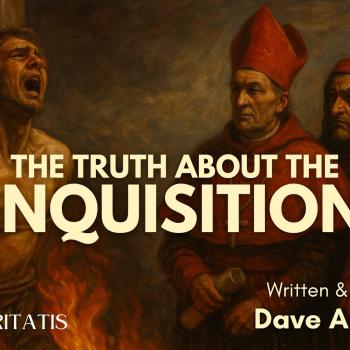Portrait of Giordano Bruno (1548-1600) [Wikimedia Commons / Creative Commons Attribution 4.0 International license]
Lo and behold, in a combox having to do with the Galileo affair, somehow, the atheists wanted to start harping and carping on about the execution of heretics 500-800 years ago (even though not a finger was laid upon Galileo). Now, if you, dear reader, can explain to me how that is on-topic, and relevant, please let me know. But since it was brought up, I also dared to bring up abortion (the great taboo subject of your time that must never be mentioned in polite company), and also made an analogy of the Inquisition and its rationale, to ISIS, that I just thought of today. Words of my dialogue opponents will be in different colors.
* * * * *
Octavo I have to say that I’m more dismayed by the fact that the church burned people like Giordano Bruno at the stake for heresy than I am that Galileo was confined to house arrest over a scientific dispute, especially since Pope John Paul II apologized about the treatment of Galileo back in 1992.
Korou I kind of agree with you except about the last part – does an apology count after more than three hundred years? At this stage, it’s more a mark against the Church than for it.
It’s more that it’s weird to see Catholics defending the treatment of Galileo when the Pope himself apologized for it.
Where have I defended the treatment of Galileo? The paper is not a defense, but an examination of lesser-known facts amidst all the myths.
It seemed like you were implying that Saint Robert Bellarmine was right to judge the way he did in the Galileo affair. Maybe I misread your tone and intent, as well as that of the quoted passage in the Catholic Encyclopedia.
I’m curious as to what you think about Saint Bellarmine’s judgement in the Bruno case?
I was simply saying that he was right about scientific theory, more so than Galileo was.
We have to understand that for the medievals, heresy was as dangerous as bodily harm, because it harmed people’s souls. Therefore, it was punishable. It was usually assumed that people were in bad faith, rather than ignorant.
I’m not in favor of capital punishment for heresy, nor is the Church now.
And once again, I must ask: are you equally concerned and scandalized by 3,000 babies in their mothers’ wombs being tortured and executed every day in America?
[see facts about what Bruno actually believed]
It isn’t surprising to me that the church put heretics to death for the reasons you mention, but I don’t believe in the moral authority of the church. If executing heretics like Bruno is wrong now, was it always wrong? If not, does past execution of heretics undermine the moral authority of the church?
Abortion is an interesting change of subject, but it’s your blog. I don’t believe in legally enforcing continued pregnancy, but I do support contraception, which does reduce abortions.
Quite true. Same for the Inquisition.
Same for abortion, too: today’s genocide, with many more millions executed for no crime at all, than the Church ever recommended to be killed (for heresy).
Can we perhaps get an admission that the Church “recommending that people be killed for heresy” was a wrong thing to do?
No problem. I’ve never been in favor of it. The Church has not been for hundreds of years. But there is a case that can be made that it was internally coherent in the minds of people who profoundly cared about religious matters. If crime was punishable, so was heresy (they reasoned).
This is what virtually no one understands today, They act as if it was merely power-hungry, bloodthirsty stuff, that had no possible honorable motive.
We find it perfectly acceptable to kill bin Laden because he was responsible for 3,000 deaths due to terrorism.
But we have no opinion whatever about a person or group that leads far more than 3,000 human beings astray with some false religious teaching (say, ISIS).
ISIS is a good example, because it brings corrupt religion and bodily harm together. These people will destroy normal human civilization if left unopposed, and so we are justified in opposing them, and a large, significant part of the reason is their religious fanaticism and evil in the name of religion: which is awful close to the rationale for capital punishment for heresy in the Middle Ages.
Thus, if we ponder for a few moments what we think of ISIS (the group that rapes women, sells them into slavery, beheads children and many others, destroys entire Christian communities, demands forcible conversion to Islam, on pain of death, etc.) and what we should do about them, we will come a long way to understanding what the medievals thought about those who taught rank heresies, over against Catholic teaching.
The Nazis had a wicked, quasi-religious ideology as well, drawing from strange esoteric religious views and the occult, and “Aryan supremacy.” Part and parcel of their wickedness was this quasi-religious view. Left unchecked, it would have destroyed western civilization.
Likewise, the heresies of the Middle Ages were not just some harmless belief-systems that people held behind closed doors, that didn’t and wouldn’t harm a flea. They had dire consequences for civilization (especially the radical notions of Albigensianism or Catharism). The Crusades, of course, had to do with the imperialistic threat of a militant Islam: not unlike the situation of ISIS today.
It was not a simple equation of “you guys disagree with us? We will wipe you out!” If we think about “radical jihadist [corruption of] Islam” today, we have a good idea of what the medievals thought of the Albigensians, Cathari, and other radical religious groups, which were corruptions of Christianity.
If abortion actually involved executing persons rather than removing fetuses then yes, that would be a terrible thing. As it is – millions of women getting surgical procedures performed safely? What good news.
Very well, then: how do you define a person, and why should anyone be bound to your (I will argue, quite arbitrary) definition? When did you yourself first come into existence?
Sophia Sadek The treatment of Bruno convinced Francis Bacon that he needed to keep some of his more radical ideas confined within a circle of trusted friends.
What can preborn babies do today to protect themselves from murder? Not much that I can see.
Some folks sympathize with the fetus that occupies the womb today, while others sympathize with the woman who would prefer to defer maternity to a future date for the sake of the fetus to come. Never the twain shall meet.
We care about both. Your group obviously doesn’t give a damn about the preborn child. You care about only one person involved. We care about mother and child, which is why we created many thousands of crisis pregnancy centers.
Killing one’s own child will never be good for any mother at any time. Therefore, educating and assisting mothers in crisis helps them as well as their child. It’s a win-win scenario, not a win-LOSE scenario, as your pro-abortion views always are.
We must simply agree to disagree.
Wally Noon The Pope employed a full time executioner and torturer at the Vatican until the late 19th century and you worry about apologetics for the treatment of Galileo?
Please document this. Thanks.
[no reply, so a day later, I asked again:]
I asked you to document this yesterday and you still haven’t. Or did it just sound good, so you threw it out, regardless of factual documentation?
Also, since you have such a tender conscience about executions, what do you think of 3,000 babies in their mothers wombs being tortured and executed every day in America? Their heresy was being alive, and having parents who were irresponsible with their sexual organs. Certainly those are crimes punishable by torture and execution, right?
The way you bring abortion up at every opportunity, you certainly seem to think it is a trump card. How about a child who is raped and becomes pregnant – do you think she should be denied an abortion and forced to bear the child of her rapist? Or how about a woman who will die if she does not have an abortion – do you think that she should, then, die?
Yes I do bring it up. Elsewhere I have written [one / two] about the notion that abortion is an annoying “one-issue” or “single issue” thing that we ought to ignore.
Now why don’t you reply to what I actually said about it?
Whether it is a “trump card” is for others to decide. But it is certainly relevant when a few thousand executions under Catholic auspices from 500-900 years ago are brought up and thrown in our face. It’s perfectly sensible to ask, “okay, what do you think about these executions taking place today (3,000 a day) for no reason, against perfectly innocent human beings?” And invariably we get back either silence or these garden-variety hard cases, which in turn, shows the extreme weakness of the ethical “reasoning” involved.
A child should not be murdered because of the sad and tragic circumstances of its birth, anymore than it should be murdered at five years of age because he or she may have one or two beasts for parents. Murder is not the solution to anything. The child is still half the mother’s. It can be brought to term and then offered for adoption. That is a moral and heroic solution to a sad situation; not an indefensible one.
The knowledge that “I killed my own child because his / her father was a wicked rapist” will not help anyone. Knowing that “I allowed my child to live” is something that can easily be lived with. The rape can’t be undone in any event. But we can choose to bring at least some good out of the evil. That applies to many situations in life.
The “have an abortion or die” scenario is extremely rare. It almost never happens. This was confirmed once at a meeting I attended at the University of Michigan, by an abortionist. But it’s wonderful propaganda and “plays” wonderfully to our sick pro-abortion (supposedly “pro-choice”) society, so it’s used. It’s all about what works: not the actual truth of the matter.
The Catholic Church teaches that if a mother’s life is truly in danger, a doctor can and should, of course, do all he can to preserve her life. We only say that he cannot directly kill the child. If the child dies indirectly due to medical procedures, then it is regarded as “saving one life, while not directly causing the end of another,” and is perfectly permissible.
In any event, this is so rare that it shouldn’t be brought up in a discussion of why and for what ethical reason 3,000 perfectly healthy babies with perfectly healthy mothers, are wantonly tortured and murdered every day in America.
For more on the Inquisition and related issues:
“50-68 Million” Killed in the Inquisition?
The Inquisition: Its Purpose and Rationale Within the Medieval Worldview














